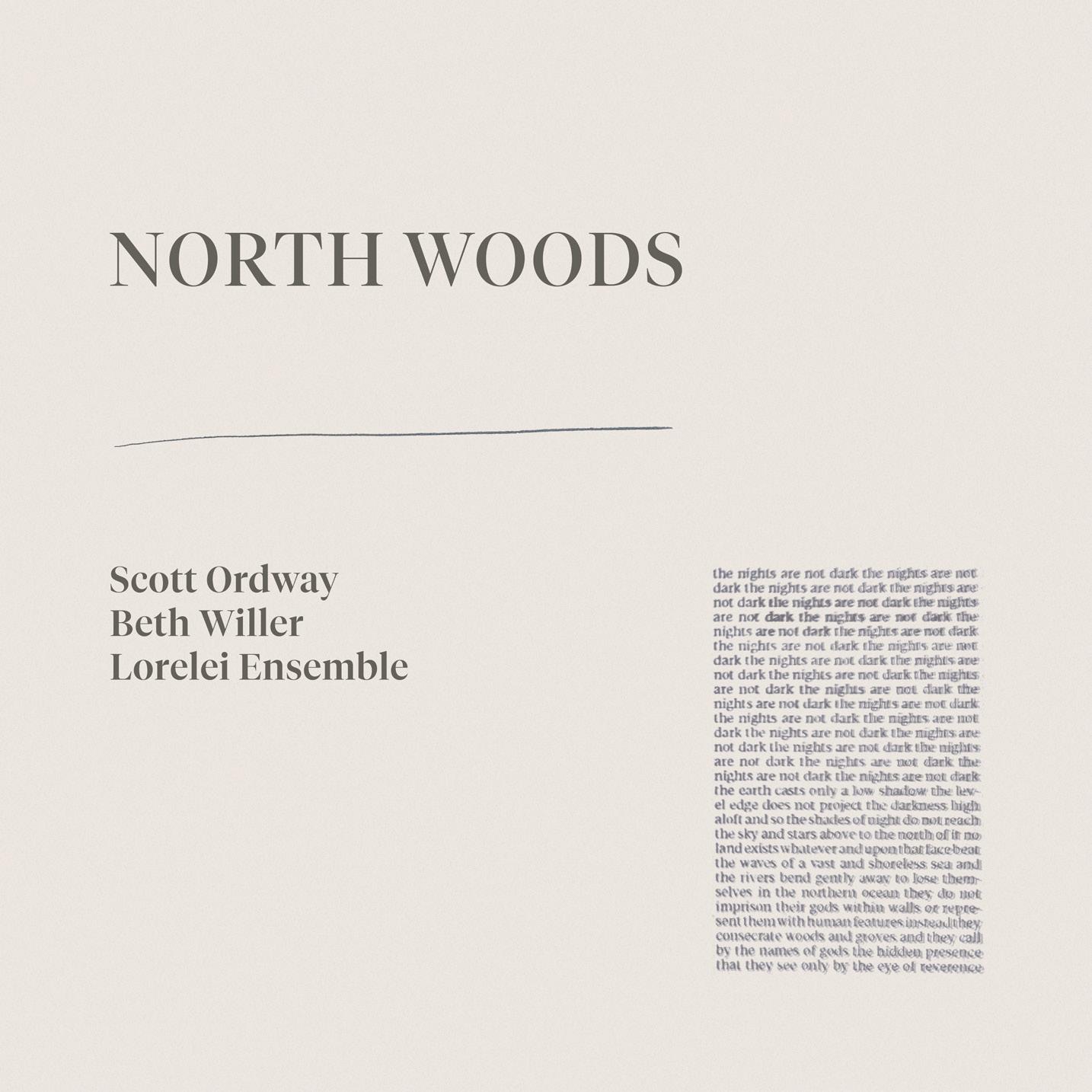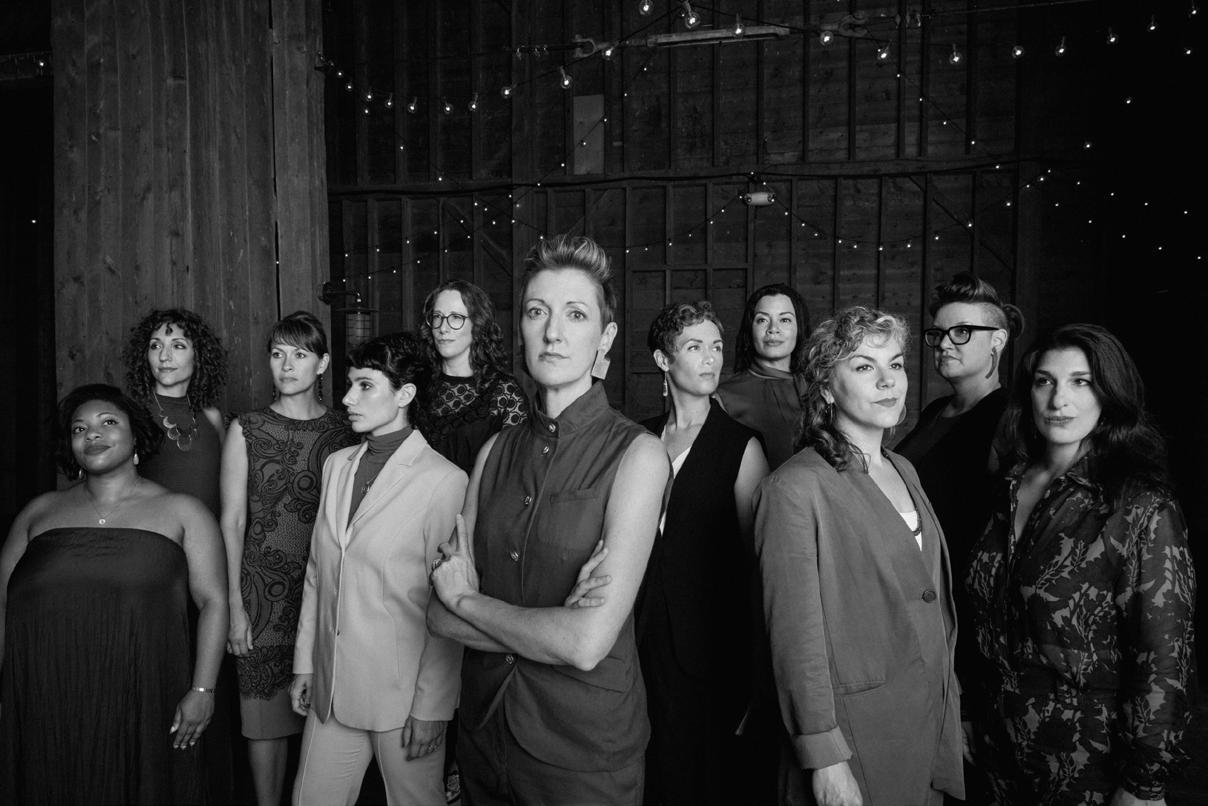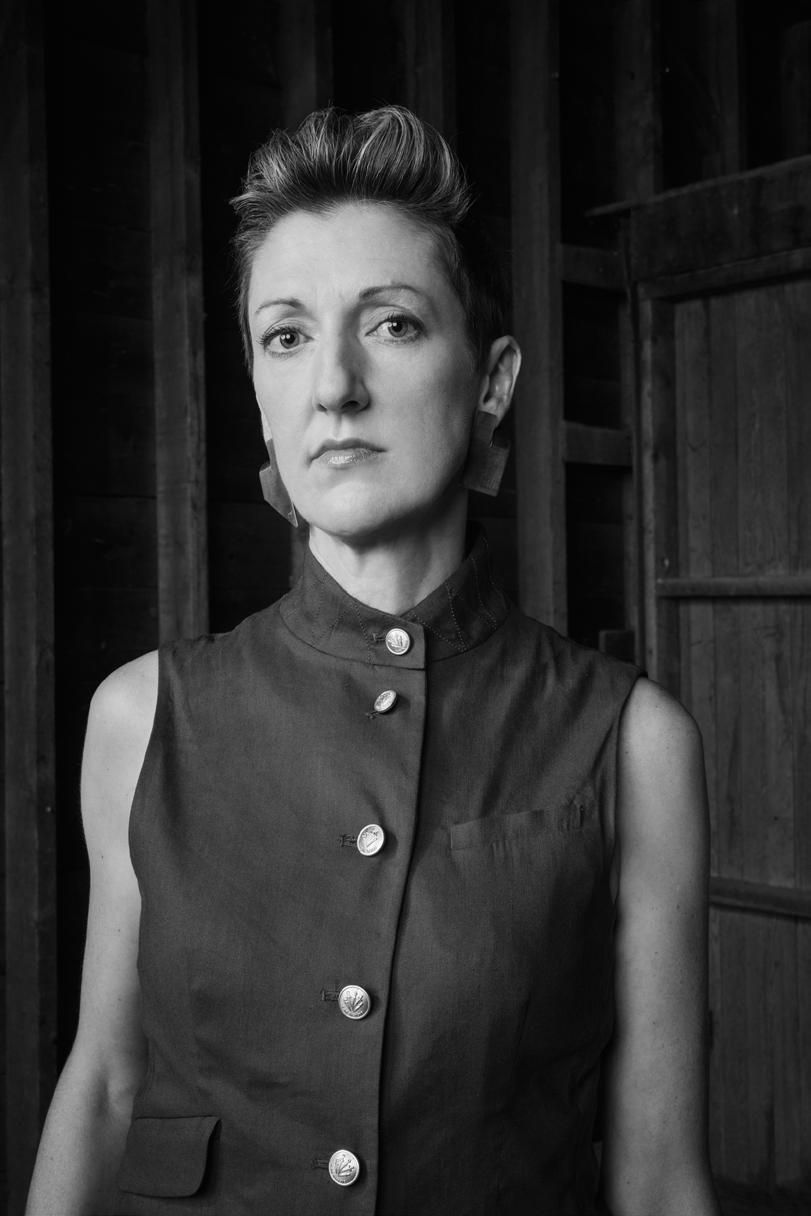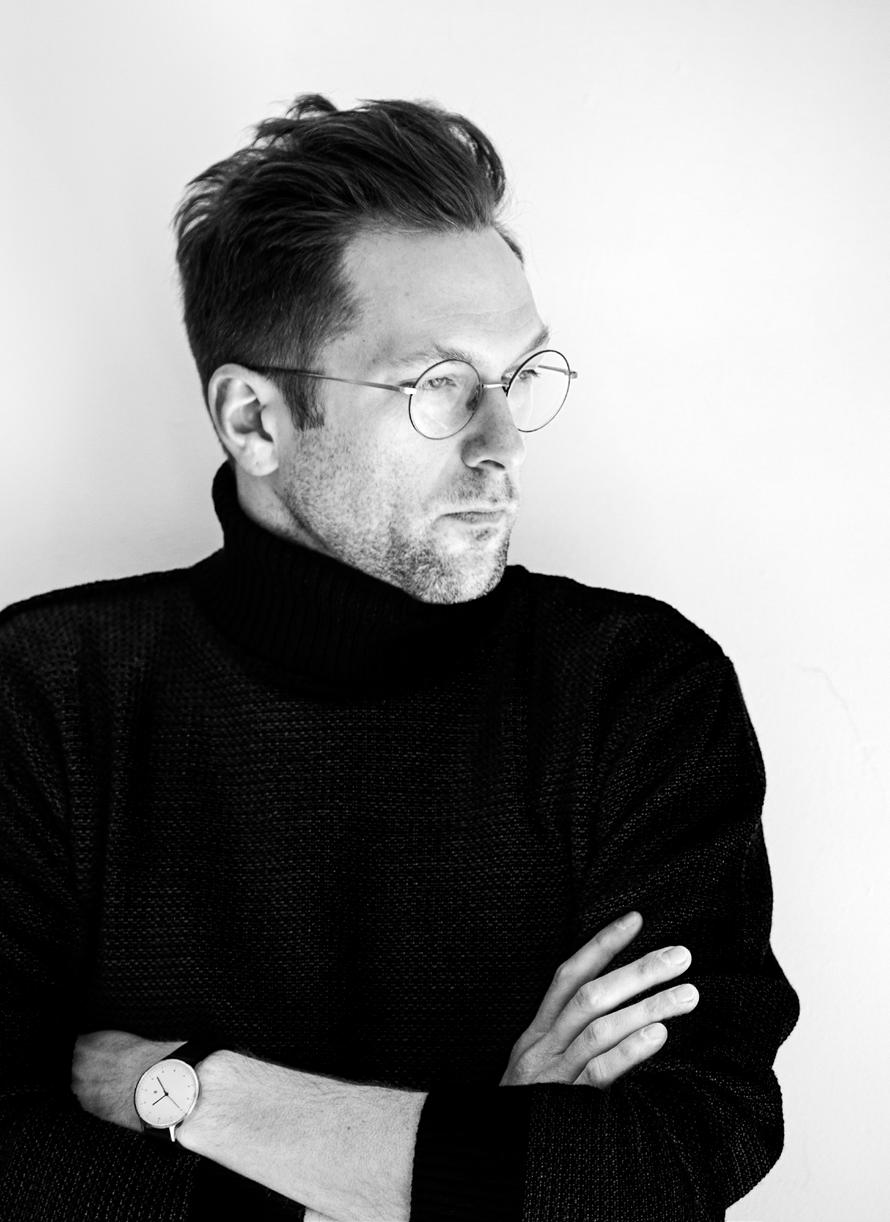
New Focus Recordings
Lorelei Ensemble
Jessica Beebe
Sarah Brailey
Christina English
Stephanie Kacoyanis
Emily Marvosh
Sophie Michaux
Arwen Myers
Rebecca Myers
Beth Willer, conductor
Text
by Scott Ordway, after Tacitus
I.
The nights are not dark; the Earth casts only a low shadow. The level edge does not project the Darkness high aloft (and so) the shades of night do not Reach the sky and stars above. [Ag. 2]
II.
To the north of it no land Exists whatever, and upon that Face beat the waves of a Vast and shoreless sea. [Ag. 10] And the rivers bend gently away To lose themselves in the Northern Ocean. [Ger. 1]
III.
They do not imprison their gods within Walls, or represent them with Human features; Instead, they consecrate Woods and groves, And they call by the names gods the Hidden presence that they see only by the eye of reverence. [Ger. 9]
Appendices I. II. III. repeat the texts above.
Sources: Tacitus: Agricola and Germania (both ca. 98 CE)
We all know the most about the physical and social worlds that are closest to our own. As curiosity or compassion shifts our attention further afield, we know progressively less, and, at some point, we arrive at a place where knowledge fades away completely and is replaced by pure imagination.
This boundary between knowing and unknowing is where many of our best and some of our worst qualities emerge. It is where hatred, prejudice, and fear often originate. But it is also the birthplace of religious imagination, artistic creation, and social progress. In this place, standing at the distant edge of what we know and looking out at the vast expanse of what we do not, we are able to imagine—and sometimes create—a world beyond our own that is better, or more beautiful, or simply different than the one we already have.
Late in the first century, Tacitus (56–120 CE) wrote two histories—Agricola and Germania (both ca. 98 CE)—describing the landscape and culture at the northern boundary of the Roman Empire. He never traveled there himself, instead building his narrative from a wide range of fragmented sources. Unsurprisingly, much of what he wrote was wrong. But where his understanding of the world ended, the magnificence of his imagi-
nation began to reveal itself and he gave us an endless ocean, a forest at the edge of creation, and shadows cast upward by the level edge of the earth itself.
His error, and the softly glowing forest world he imagined, are the starting point for North Woods (2014), a work for eight-part treble choir in three movements followed by a short appendix. For me, this imaginative error is not a flaw but a model: mystery and uncertainty can generate new structures of thought, and of sound.
Reading Tacitus, I was drawn to the passages most saturated with his wonder at the strangeness of the imagined idea of the north. They brought to mind Glen Gould’s 1967 radio documentary The Idea of North, another work based on minimal first-hand experience but which addresses an abstract “north” as a place of strangeness and imagination. Tacitus’ descriptions of the landscape are wide-eyed and radiant, as if he is telling us something he himself can’t quite believe: the nights are not dark, the ocean is endless, and shadows don’t behave as they do in the real world.
Most important for me is his observation that “they do not imprison their gods within walls”, an allusion to the pre-Christian for-
est paganism which then organized life in Northern Europe and which, in an oddly circular turn, resembles how I grew up in Northern California. If there were a higher power anywhere to be found in 1990s Santa Cruz, they would probably have been found in the shadowy mountains and canyons of the coastal redwood forest.
This intensive relationship to forests continues to guide me personally, and inspires much of my creative work. I do not romanticize them as picturesque landscapes, and I do not turn to them as a source of national pride—we have done nothing to deserve these trees. Instead, I relate to forests in the same way as Tacitus’ half-real Germans: they are where I go to connect with the world on a deep and irrational level, to make important decisions, and to know who I am. They are where I go to recover myself. This is the sense of the forest that informs my work.
Whether reading Tacitus or walking in the California redwoods, I experience forests as architectural spaces rather than as stories. Instead of narrative, I experience the quality of the light, the texture of the air, and the soft instability of the soil.
In my collaboration with the extraordinary singers of Lorelei Ensemble, I have
sought to create music that reflects this kind of space by drawing on the sonic qualities I value most: light, sonority, clarity, texture, and restraint. I wanted to make a quiet, shared, and sacred acoustic environment that is grounded in careful attention to the resonance and quality of sound itself. Through their artistry, Lorelei has made my imagined space into something real.
The structure of the work is designed to showcase the power, precision, and emotional intensity of treble voices—qualities often lacking in repertoire for soprano and alto choirs. This is a place that only an ensemble like Lorelei—and the many ambitious young singers they now inspire—can go. In drawing on these qualities, North Woods belongs to a lineage of modern vocal music that is concerned with the construction of sonic environments—spacious architectures of measured resonance in service of ecological and spiritual themes. In the end, what I wanted to make and to share was a generous and detailed acoustic space like the forests in my own life, a place where nothing moves but everything is radiant.
—Scott Ordway, August 2025
Scott Ordway wrote North Woods for Lorelei in 2014, at a time when we were honing in on precisely who we were as an ensemble, and what we had to offer an already rich landscape of vocal ensemble music. It is rare for Lorelei to keep a piece in our repertoire for more than 10 years. Why, then, does this piece still have such a hold on us?
North Woods is a work that has defined Lorelei’s sound for many listeners. It is unique in its ability to both capture a part of Lorelei’s past while still fitting us extremely well in the present. It carries with it the memories of the many singers who have lent their voices to its soloistic yet anonymous textures, of the places and spaces that we have offered it to, and of the friendship I hold with a composer who has known Lorelei since almost our very beginning.
We commissioned it, perhaps surprisingly, as part of a “New Americana” program, premiering it alongside works of Joshua Bornfield, Mary Koppel, and Joshua Shank, and early and contemporary shapenote repertoire. I remember discussing the concept from the deck of my parents’ house in Northern Wisconsin, surrounded by white pine and oak trees, with Scott speaking to me from his new academic post situated in the woods of Maine. We were both inter-
ested in creating a piece that represented a vast natural landscape—and particularly the most isolated parts of this landscape—as a snapshot of a distinct American perspective. That perspective is both inherent in me, as a former resident of the vast grasslands of the Great Plains, and something I now must work to remind myself of as a mid-Atlantic city-dweller.
The text by first-century historian Tacitus, particularly the third movement and its awe-struck reverence for the natural world, is that reminder for me:
They do not imprison their gods Within walls, or represent them with Human features; Instead, they consecrate Woods and groves, And they call by the names gods the Hidden presence that they see only by the eye of reverence.
I have now listened to these words sung by Lorelei so many times that I easily and frequently recall them while I’m walking through the Maryland woods—one of my favorite ways to escape the human-centric world that spins around us. These words remind me of the ways my own definition
of the divine and omnipresent have evolved, as has my understanding of what it means to be American. For me, and in this piece, these are not fixed ideas, but rather expansive and inclusive ideas that echo the expanse of this inimitable, boundless natural world that precedes and succeeds each of us in our brief existence.
—Beth Willer, August 2025

Lorelei Ensemble
Heralded for its “white-hot intensity” (New York Times) and “stunning precision of harmony, intonation, and...spectacular virtuosity” ( Gramophone Magazine ), the GRAMMY-nominated Lorelei Ensemble is recognized across the globe for its bold and inventive programs that champion the extraordinary flexibility and virtuosity of the human voice. Led by founder and artistic director Beth Willer, Lorelei has established an inspiring mission, curating culturallyrelevant and artistically audacious programs that stretch and challenge the expectations of artists and audiences alike.
Lorelei Ensemble is creating a living repertoire for a living audience, working with today’s leading composers to commission more than 70 new works that expand and deepen the repertoire of sounds, timbres, words and stories that women use to reflect and challenge our world. This new repertoire for women’s and treble voices demands fierce flexibility and openness from each artist and listener, allowing unparalleled music making that is born from the unique position of power and cultural influence that women hold. Collaborating composers include David Lang, Julia Wolfe, George Benjamin, Kati Agócs, Lisa Bielawa, Kareem Roustom, Jessica Meyer, and many more. Recent proj-
ects and commissions include Julia Wolfe’s Her Story, Christopher Cerrone’s Beaufort Scales, Katherine Balch’s songs and interludes, and a new collaborative program called BREATHE featuring composer-performers Charlotte Greve, Wendel Patrick, Ken Thomson, and Jason Treuting.
Recordings document and preserve the work of Lorelei and its collaborators for future artists and audiences. On the Cantaloupe, Cold Blue, New Focus, Sono Luminus, and BMOP Sound labels, Lorelei has recorded the music of living composers Kati Agócs, Peter Gilbert, James Kallembach, David Lang, Jessica Meyer, Scott Ordway, and Julia Wolfe, as well as historical repertoires from William Billings, Guillaume Du Fay, Alfred Schnittke, Tōru Takemitsu, the Turin Codex and the Codex Calixtinus. Lorelei was recognized with a 2025 GRAMMY Award nomination in the category of Best Chamber Music/Small Ensemble Performance for its recording of Christopher Cerrone’s Beaufort Scales (2024, Cold Blue Music). Other recent releases include I long and seek after with Jessica Meyer (New Focus Recordings, 2024), and James Kallembach’s Antigone: The Writings of Sophie Scholl (New Focus, 2022).
Lorelei Ensemble maintains a robust national touring schedule, including collabo-
rations with the Boston, Chicago, San Francisco, Cincinnati, National, and Nashville symphonies, Boston Modern Orchestra Project, Tanglewood Music Center Orchestra, A Far Cry, and Cantus, and performances at celebrated venues across the country, including Carnegie Hall, the Metropolitan Museum of Art, Tanglewood Music Center, and Boston’s Symphony Hall.
Committed to education, Lorelei is empowering young artists to be our next creative leaders through its work with rising performers and composers at children’s choirs, high schools, and colleges and universities across the country. Cultivating both individual and collaborative artistry, Lorelei helps young artists hone their skills to become flexible, perceptive, and openminded musicians. Past residencies include work with singers, ensembles, conductors, and composers at the Eastman School of Music, Harvard University, Yale University, Duke University, University of Iowa, Cornell University, and more.
The ensemble was founded in Boston in 2007. Lorelei Ensemble’s roster of artists is based across the United States and maintains active performing and teaching schedules. Learn more at loreleiensemble.com.
Beth Willer
Noted for her “directorial command,” “technical expertise,” and commitment to the contemporary vocal art, Founder and Artistic Director Beth Willer has led the GRAMMY-nominated Lorelei Ensemble since 2007 to become recognized as one of the country’s leading vocal ensembles. A champion of contemporary music, Willer has collaborated with composers from the U.S. and abroad, leading Lorelei and other ensembles in numerous world, U.S., and regional premieres, including works by Julia Wolfe, Kati Agócs, George Benjamin, Lisa Bielawa, Christopher Cerrone, Peter Gilbert, James Kallembach, David Lang, Jessica Meyer, Scott Ordway, John Supko, Kareem Roustom, and Reiko Yamada. As a recognized conductor of vocal ensembles and contemporary music, Willer has led performances featuring the Bang on a Can All-Stars, Roomful of Teeth, Voices of Ascension, Seraphic Fire, and New York Baroque Inc., and has frequently prepared ensembles for performances with the Boston Symphony, Chicago Symphony, San Francisco Symphony, Nashville Symphony, National Symphony and Cincinnati Symphony Orchestras, Tanglewood Music Center Orchestra, Cantus, A Far Cry, Boston Modern Orchestra Project, and Odyssey Opera, in collaboration with Marin
Alsop, Thomas Adès, Andris Nelsons, and Giancarlo Guerrero.
Willer is Associate Professor and Director of Choral Studies at the Peabody Institute of The Johns Hopkins University, where she leads vocal ensembles and graduate program in choral conducting. Previous work includes academic appointments at Bucknell University, Harvard University, and The Boston Conservatory. A passionate educator and conductor of young artists, Willer has led ensembles at Boston University’s Tanglewood Institute, the Walnut Hill School, New England Conservatory’s Preparatory School, and the Boston Arts Academy. A versatile and vibrant clinician, Willer also enjoys frequent work as a guest conductor of student, community, and professional ensembles across the country.
Willer holds degrees from Boston University (D.M.A. and M.M.) and Luther College (B.A.). Her teachers include Ann Howard Jones, Scott Metcalfe, Weston Noble, Jameson Marvin, and Mark Shapiro.


Scott Ordway
Scott Ordway (b. 1984, California) is an American composer and multimedia artist whose widely acclaimed work spans music, text, photography, and film. His compositions have been described as “exquisite” (New York Times), “hypnotic” (BBC Music), and “a marvel” (Philadelphia Inquirer), and have been presented at Carnegie Hall, Wigmore Hall, Lincoln Center, Boston’s Symphony Hall, Stanford Live, and major festivals in the US, Europe, and Asia.
Ordway’s work explores the relationship between slowness, stillness, and emotional intensity. Rooted in the classical tradition but radically open in form and tone, his compositions fuse text, sound, image, and memory to evoke a sense of longing, loss, and connection—especially to the natural world and to one another. Influenced by artists of stillness and scale—from Gustav Mahler to Hiroshi Sugimoto, and shaped by the emotional directness of underground indie and posthardcore music—his work privileges duration and resonance over virtuosity or display. Raised in Northern California, Ordway draws on the landscapes of the American West—their light, silence, and spiritual vastness—as a continuous source of artistic inspiration. Recent projects include The End of Rain, a multimedia oratorio for Roomful
of Teeth and the Cabrillo Festival of Contemporary Music confronting wildfire and drought in the Western U.S.; The Outer Edge of Youth, a choral opera commissioned and recorded by The Thirteen, and The Clearing and the Forest, an immersive music-theater work for SOLI Chamber Ensemble rooted in ritual and exploring the relationship between landscape and migration. In 2024, he premiered Expanse of My Soul, a song cycle created in close collaboration with Grammywinning mezzo-soprano Sasha Cooke, setting fragments of her personal letters in a poetic exploration of love, memory, and the interior landscapes that shape us. Hailed as “an American response to Sibelius” by the Boston Globe, his music has been performed by the Hong Kong, Buffalo, and Colorado Springs Philharmonics; Tucson Symphony; vocal ensembles Roomful of Teeth, Lorelei Ensemble, and The Thirteen; and soloists including Sasha Cooke, Arlen Hlusko, Anyango Yarbo-Davenport, Sonja Tengblad, and Emily Marvosh, among many others. His chamber music collaborations include SOLI Chamber Ensemble, Tanglewood New Fromm Players, Norbotten NEO (Sweden), and the Jasper, Momenta, Daedalus, and Arneis String Quartets. Ordway has released four critically-
acclaimed solo recordings on the Acis label in addition to appearances on Naxos, Bright Shiny Things, and TRPTK (Netherlands).
In addition to his work as a composer, Ordway is active as a writer, director, video artist, and photographer. His visual art has been featured in solo exhibitions at the Kunstverein Familie Montez in Frankfurt am Main and Boston’s Laconia Gallery and published in the San Francisco Chronicle.
His work is supported by numerous awards, fellowships, and grants from the National Endowment for the Arts, ASCAP, NewMusicUSA, the American Composers Orchestra, Alice M. Ditson Fund of Columbia University, American Music Center, Pennsylvania Council on the Arts, American Composers Forum, and American Opera Projects, where he was a Fellow. A recipient of the Tuttle Creative Residency Award from Haverford College’s Hurford Center for the Arts and Humanities, he has also been invited for residencies at Copland House, Visby International Center for Composers (Sweden), Brush Creek Foundation for the Arts (WY), Willapa Bay AiR (WA), and Hambidge Center for Creative Arts & Sciences, where he was a Distinguished Fellow. He has served as Composer-in-Residence at the Cabrillo, Newburyport, and Carolina Chamber Music Festivals.
Ordway studied at the Universities of Pennsylvania, Oregon, and Puget Sound, the Freie Universität Berlin, and Accademia
Chigiana where his teachers included Samuel Adler, Azio Corghi, Robert Hutchinson, Robert Kyr, James Primosch, Jay Reise, and Veljo Tormis.
A voting member of the Recording Academy, Scott currently serves as Associate Professor of Music and Head of Composition at Rutgers University. He lives in Philadelphia where he taught previously at the Curtis Institute of Music.
Recorded 8 August 8 2021
Mechanics Hall (Worcester, MA)
Produced by Jesse Lewis
Recorded by Jesse Lewis and Kyle Pyke
Mixed by Kyle Pike
Mastered by Christopher Moretti
Photography Credits:
Lorelei Ensemble by Ebru Yildiz
Beth Willer by Ebru Yildiz
Scott Ordway by Amanda Greene
Cover and Booklet Design by Scott Ordway
North Woods was commissioned by Lorelei Ensemble with support from NewMusicUSA and first performed on 31 October 2014 at Marsh Chapel (Boston, MA) by Lorelei Ensemble and Beth Willer.
FCR447 © 2025 New Focus Recordings. All rights reserved. Made in the USA. newfocusrecordings.com

